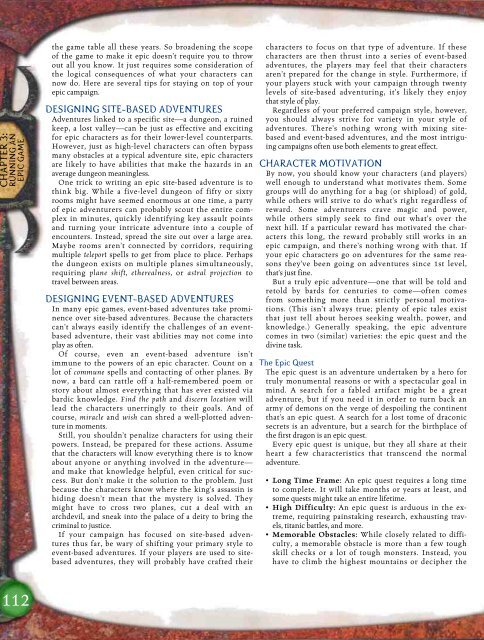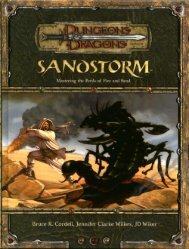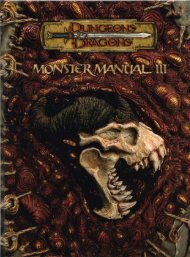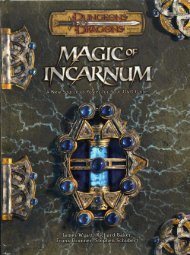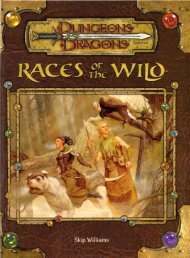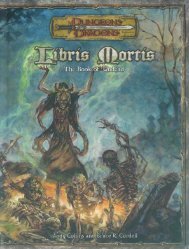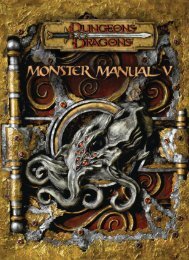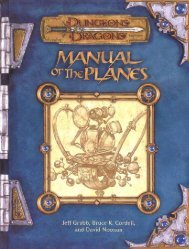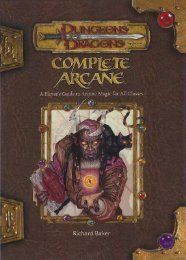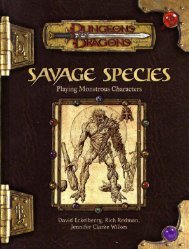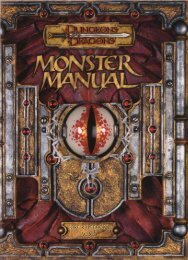Epic Level Handbook
Epic Level Handbook
Epic Level Handbook
- No tags were found...
Create successful ePaper yourself
Turn your PDF publications into a flip-book with our unique Google optimized e-Paper software.
CHAPTER 3:RUNNING ANEPIC GAMEthe game table all these years. So broadening the scopeof the game to make it epic doesn’t require you to throwout all you know. It just requires some consideration ofthe logical consequences of what your characters cannow do. Here are several tips for staying on top of yourepic campaign.DESIGNING SITE-BASED ADVENTURESAdventures linked to a specific site—a dungeon, a ruinedkeep, a lost valley—can be just as effective and excitingfor epic characters as for their lower-level counterparts.However, just as high-level characters can often bypassmany obstacles at a typical adventure site, epic charactersare likely to have abilities that make the hazards in anaverage dungeon meaningless.One trick to writing an epic site-based adventure is tothink big. While a five-level dungeon of fifty or sixtyrooms might have seemed enormous at one time, a partyof epic adventurers can probably scout the entire complexin minutes, quickly identifying key assault pointsand turning your intricate adventure into a couple ofencounters. Instead, spread the site out over a large area.Maybe rooms aren’t connected by corridors, requiringmultiple teleport spells to get from place to place. Perhapsthe dungeon exists on multiple planes simultaneously,requiring plane shift, etherealness, or astral projection totravel between areas.DESIGNING EVENT-BASED ADVENTURESIn many epic games, event-based adventures take prominenceover site-based adventures. Because the characterscan’t always easily identify the challenges of an eventbasedadventure, their vast abilities may not come intoplay as often.Of course, even an event-based adventure isn’timmune to the powers of an epic character. Count on alot of commune spells and contacting of other planes. Bynow, a bard can rattle off a half-remembered poem orstory about almost everything that has ever existed viabardic knowledge. Find the path and discern location willlead the characters unerringly to their goals. And ofcourse, miracle and wish can shred a well-plotted adventurein moments.Still, you shouldn’t penalize characters for using theirpowers. Instead, be prepared for these actions. Assumethat the characters will know everything there is to knowabout anyone or anything involved in the adventure—and make that knowledge helpful, even critical for success.But don’t make it the solution to the problem. Justbecause the characters know where the king’s assassin ishiding doesn’t mean that the mystery is solved. Theymight have to cross two planes, cut a deal with anarchdevil, and sneak into the palace of a deity to bring thecriminal to justice.If your campaign has focused on site-based adventuresthus far, be wary of shifting your primary style toevent-based adventures. If your players are used to sitebasedadventures, they will probably have crafted theircharacters to focus on that type of adventure. If thesecharacters are then thrust into a series of event-basedadventures, the players may feel that their charactersaren’t prepared for the change in style. Furthermore, ifyour players stuck with your campaign through twentylevels of site-based adventuring, it’s likely they enjoythat style of play.Regardless of your preferred campaign style, however,you should always strive for variety in your style ofadventures. There’s nothing wrong with mixing sitebasedand event-based adventures, and the most intriguingcampaigns often use both elements to great effect.CHARACTER MOTIVATIONBy now, you should know your characters (and players)well enough to understand what motivates them. Somegroups will do anything for a bag (or shipload) of gold,while others will strive to do what’s right regardless ofreward. Some adventurers crave magic and power,while others simply seek to find out what’s over thenext hill. If a particular reward has motivated the charactersthis long, the reward probably still works in anepic campaign, and there’s nothing wrong with that. Ifyour epic characters go on adventures for the same reasonsthey’ve been going on adventures since 1st level,that’s just fine.But a truly epic adventure—one that will be told andretold by bards for centuries to come—often comesfrom something more than strictly personal motivations.(This isn’t always true; plenty of epic tales existthat just tell about heroes seeking wealth, power, andknowledge.) Generally speaking, the epic adventurecomes in two (similar) varieties: the epic quest and thedivine task.The <strong>Epic</strong> QuestThe epic quest is an adventure undertaken by a hero fortruly monumental reasons or with a spectacular goal inmind. A search for a fabled artifact might be a greatadventure, but if you need it in order to turn back anarmy of demons on the verge of despoiling the continentthat’s an epic quest. A search for a lost tome of draconicsecrets is an adventure, but a search for the birthplace ofthe first dragon is an epic quest.Every epic quest is unique, but they all share at theirheart a few characteristics that transcend the normaladventure.• Long Time Frame: An epic quest requires a long timeto complete. It will take months or years at least, andsome quests might take an entire lifetime.• High Difficulty: An epic quest is arduous in the extreme,requiring painstaking research, exhausting travels,titanic battles, and more.• Memorable Obstacles: While closely related to difficulty,a memorable obstacle is more than a few toughskill checks or a lot of tough monsters. Instead, youhave to climb the highest mountains or decipher the112


